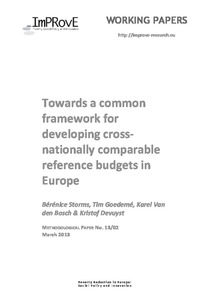Towards a common framework for developing cross-nationally comparable reference budgets in Europe
"This paper considers the measurement of poverty in the European Union (EU). Starting from a definition of poverty that is suitable for the European context, a flexible measurement framework is proposed based on the Foster-Greer-Thorbecke class of poverty measures. Three key issues need to be a...
| Main Authors: | , , , , |
|---|---|
| Institution: | ETUI-European Trade Union Institute |
| Format: | TEXT |
| Language: | English |
| Published: |
Antwerp
2013
ImPRovE |
| Subjects: | |
| Online Access: | https://www.labourline.org/KENTIKA-19128800124919460829-Towards-a-common-framework-for.htm |
| _version_ | 1771659902164402178 |
|---|---|
| author | ImPRovE, Antwerp Decancq, Koen Goedemé, Tim Van den Bosch, Karel Vanhille, Josefine |
| author_facet | ImPRovE, Antwerp Decancq, Koen Goedemé, Tim Van den Bosch, Karel Vanhille, Josefine |
| collection | Library items |
| description | "This paper considers the measurement of poverty in the European Union (EU). Starting from a definition of poverty that is suitable for the European context, a flexible measurement framework is proposed based on the Foster-Greer-Thorbecke class of poverty measures. Three key issues need to be addressed in the measurement of poverty. First, one has to determine the appropriate metric of individual well-being. Second, a cut-off value or threshold needs to be established under which persons are considered to be poor. Third, it is necessary to outline an aggregation procedure to attain a poverty figure for society as a whole. In what follows, we discuss the different answers that are implicit in the poverty measures applied in this book* and the EU’s social strategy. The EU Statistics on Income and Living Conditions (EU-SILC) are introduced as the main data source for poverty analysis in the EU. Finally, an illustration is provided of how the different conceptual choices in the measurement of poverty affect the empirical findings regarding the evolution of poverty between 2005 and 2009. It turns out that the selection of individual well-being metric and the choice between a county-specific and a pan-European poverty line strongly affect observed patterns of poverty in the EU. " |
| format | TEXT |
| geographic | EU countries |
| id | 19128800124919460829_b954bb178862419ca84472b9ff905d45 |
| institution | ETUI-European Trade Union Institute |
| is_hierarchy_id | 19128800124919460829_b954bb178862419ca84472b9ff905d45 |
| is_hierarchy_title | Towards a common framework for developing cross-nationally comparable reference budgets in Europe |
| language | English |
| physical | 43 p. Digital |
| publishDate | 2013 |
| publisher | Antwerp ImPRovE |
| spellingShingle | ImPRovE, Antwerp Decancq, Koen Goedemé, Tim Van den Bosch, Karel Vanhille, Josefine poverty statistics well being social inequality Towards a common framework for developing cross-nationally comparable reference budgets in Europe |
| thumbnail | https://www.labourline.org/Image_prev.jpg?Archive=136139195431 |
| title | Towards a common framework for developing cross-nationally comparable reference budgets in Europe |
| topic | poverty statistics well being social inequality |
| url | https://www.labourline.org/KENTIKA-19128800124919460829-Towards-a-common-framework-for.htm |

